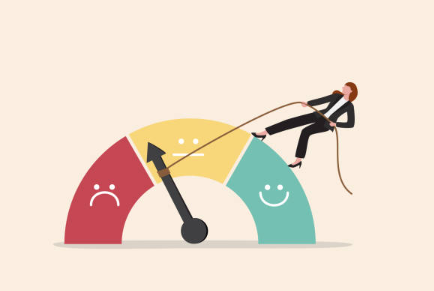Is it Better to be Optimistic or Negative?
When thinking of situations, is it better to be optimistic or negative? If you think that you are optimistic, you will be more likely to resolve problems. Pessimists, on the other hand, tend to let things slide. As a result, they are more vulnerable to stress, which may negatively affect their immune systems.

Selfpause Affirmation App
Download the app to get 1,000’s of affirmation meditations and everything you need to write, record and listen to your own.
Positive thinking

Positive thinking can help you cope with life’s ups and downs. Even people who tend to expect the worst can learn to be more positive. It can help you deal with problems, illnesses, and even depression. It can also help you look good and connect with others. The key to positive thinking is to keep your focus on the good things in life.
To develop a positive mindset, you have to recognize the situations that cause you to think negatively. Write them down and find out what triggers them. They could be anything – from your daily commute to a weekly meeting with a co-worker to buying a new pair of jeans. If you notice that you are thinking negatively, write them down and see if you can change your perspective.
Practicing positive thinking is also good for your physical health. When you feel positive, you are less likely to criticize others or yourself. You can also use positive thinking techniques to make time for fun activities. Try to include at least one activity each day that allows you to feel good. This could be meeting a friend for coffee, going for a walk, or a bike ride.
Positive thinking also helps to reduce levels of depression and general distress. It allows you to see the bright side of every situation, which can make life less stressful. It inspires you to think positively about the future and believe that everything will work out in the end.
Optimism

In the world of leadership, a balance between optimism and realism is essential. Leaders who are too optimistic may find themselves under pressure and fail to deliver results. However, those who practice a balanced approach may find themselves more effective and resilient. A key example is the case of Enron, a highly regarded energy company that went bankrupt due to a culture that fostered overconfidence. Overconfidence in a strategy can be detrimental, limiting learning and increasing risks. Rather than blindly following optimistic projections, leaders should adopt contrarian thinking to see what could go wrong and how to mitigate any potential negative effects.
Research has also shown that people who are more optimistic have a lower risk of suffering from chronic diseases and depression. They also experience lower rates of stress and blood pressure, which are both linked to depressive symptoms. Optimism is also associated with a longer lifespan. Optimism also leads to increased levels of social interaction and physical activity, which can lead to increased overall health.
Positive psychology is gaining popularity in our society as it has been shown to be correlated with good life outcomes. However, there is no definitive proof to support this, nor is there any proof that optimism is a prerequisite for success in life.
Positivity

Studies show that people who are more positive have better health and happier lives. They are more resilient to stress and are less likely to develop depression. They may also live longer. It’s also possible to learn to be more optimistic, even if you’re a pessimist. So, how do you become more positive? Here are some tips to improve your attitude. To start, practice positive thinking. Positive people are happier than pessimists, and they are more likely to be successful.
First, you must think about what you consume and listen to. There are many free online resources that promote positivity, as well as people who are positive about life. Try to be around people who make you feel good. Try to stay away from people who are negative. These people tend to influence your mindset.
Researchers have studied the relationship between optimism and immune function. They found that people who are more optimistic are more likely to have superior cell-mediated immune function. While this may seem counterintuitive, it does support the idea that optimism is linked to immune function. It is also associated with better psychological coping and a sense of control over one’s own health.
Practicing optimism is an effective method to improve the immune system and cope with bad news. It has also been linked with greater happiness. Practicing gratitude has also been found to improve people’s quality of life. Research shows that people who are grateful are happier, less stressed, and less depressed. More people should adopt these positive attitudes, and research is showing that this can be a powerful way to deal with life’s challenges.
Optimism as a mood

A growing body of research has shown that the positive mood states of optimism are associated with improved health outcomes. In one study, optimism was found to be positively associated with decreased incidence of atherosclerosis and AIDS. It was also associated with better cardiovascular functioning and reduced cardiovascular disease. Furthermore, studies have shown that high levels of optimism are associated with longer lifespan. Optimism is also known to reduce the risk of hospitalization.
The defining characteristics of dispositional optimism include the ability to perceive desired outcomes as possible and overcoming adversity. This positivity is associated with reduced levels of depression and anxiety. Furthermore, people who are optimistic are more likely to face adversity with a positive attitude.
In addition, a positive mood affects information processing. For optimists, this mood facilitates processing flexibility, as it brings diverse associations to mind and increases intrinsic interest in a task. On the other hand, a pessimist is not able to maintain a high level of positivity, and this makes the positive mood less effective.
Optimism has several different definitions. In the earlier definition, it was defined as a “mental status” and “a psychological mechanism” that drives human evolution. Alternatively, Scheier and Carver defined optimism as a “personality trait.” Regardless of the definition, it is important to note that optimism is a strong emotion that can affect our ability to face adversity.
Optimism as a trait

Having a positive outlook is a good habit to cultivate. It helps people see solutions to problems. Optimism also promotes overall wellness. People who remain positive generally live longer and have lower health risks than those who are pessimistic. However, staying positive is not easy.
Some people think that they are naturally positive. Others believe that they developed the trait after they went through some unpleasant experiences in the past. They may have realized that it was the only way to remain happy. Positive people are often ambitious and expect the best in others. Those who are negative may experience depression.
Positive people attract followers and recruit champions. They also engender trust. A positive environment encourages hard-working talent. They are also more successful. Positive people make organizations more collaborative and creative. In fact, organizations with a positive atmosphere have higher employee satisfaction. Moreover, they attract more talent and customers.
A person with a positive attitude is a joy to be around. Their positive outlook helps them lift people’s spirits and transform negative situations into opportunities. It also helps them overcome challenges. They are often able to overcome obstacles without the help of others, and their resilience inspires others. Those who have a negative attitude brood and ruminate about problems, while those who are positive roll up their sleeves and tackle them head-on.
Positivity can be a good thing, but too much of it can be harmful. Too much positive energy may be detrimental to people going through traumatic events. It may prevent people from sharing their true feelings and gaining unconditional support.
Optimism as a personality trait

Optimism is a personality trait that is a way of thinking. Some personality types have more optimism than others. Some people have a natural tendency toward optimism, while others need practice. If you want to have a more positive outlook, try to surround yourself with positive people.
There are many benefits to optimism, including the ability to cope with stressful situations. However, if you are prone to anxiety, you may find it hard to be optimistic. In that case, cognitive-behavioral therapy may be the answer. This therapy helps pessimists to identify and challenge their cognitive distortions, which are often the source of their pessimism.
Optimism is beneficial to our mental and physical health. For instance, it has been linked to a lower risk of burnout among nurses. It is also associated with lower post-traumatic stress disorder in combat veterans. Moreover, people who are optimistic have higher romantic satisfaction.
Researchers at Harvard Medical School reviewed studies on the benefits of optimism and found that people who are optimistic are less likely to suffer from health problems. Furthermore, optimists have less anxiety and lower blood pressure than pessimists. They are also more likely to achieve goals. Optimists also tend to be happier and have more friends.
Optimism is a temperament trait, but it is also a personality trait. Despite this, there are still some debates about what it means to be optimistic. For instance, some believe that it is a temperamental trait and not a personality trait.
Our Top FAQ's
Research has shown that having an optimistic outlook is generally associated with better mental health and well-being. Optimistic individuals tend to have lower levels of stress, anxiety, and depression, and they may be more resilient in the face of adversity. They also tend to have better physical health, possibly because they engage in healthier behaviors and cope better with stress. On the other hand, a negative outlook has been linked to poorer mental and physical health outcomes.
While optimism is generally seen as a positive quality, there are certain situations in which a negative outlook may be more helpful or adaptive. For example, if a person is facing a realistic threat or danger, being aware of the potential risks and being prepared to deal with them can be important for survival. In other cases, a negative outlook may help someone to be more cautious or to be more critical and analytical in their thinking, which can be useful in certain situations.
There are several strategies that a person can use to cultivate a more optimistic outlook on life. Some suggestions include setting realistic goals, practicing gratitude, focusing on the positive aspects of a situation, and seeking support from others. It’s also important to remember that it’s normal to have ups and downs, and that it’s okay to feel negative emotions from time to time.
A person’s cultural background and personal experiences can certainly influence their tendency towards optimism or negativity. For example, some cultures may place a greater emphasis on positivity and encourage people to look on the bright side, while others may be more accepting of negative emotions and view them as a normal part of life. Similarly, a person’s past experiences, such as trauma or loss, can shape their outlook on life.
An optimistic or negative outlook can have a significant impact on a person’s relationships with others. Optimistic individuals tend to be more likable and have an easier time forming and maintaining relationships, as they are often seen as more positive and enjoyable to be around. On the other hand, a negative outlook can make a person more difficult to be around, and it may lead to strained or even damaged relationships. Additionally, an optimistic outlook can help a person cope with difficult situations more effectively, as they are more likely to believe that things will eventually improve. A negative outlook, on the other hand, may make it more difficult to cope with challenges and to see the possibility of positive outcomes.
